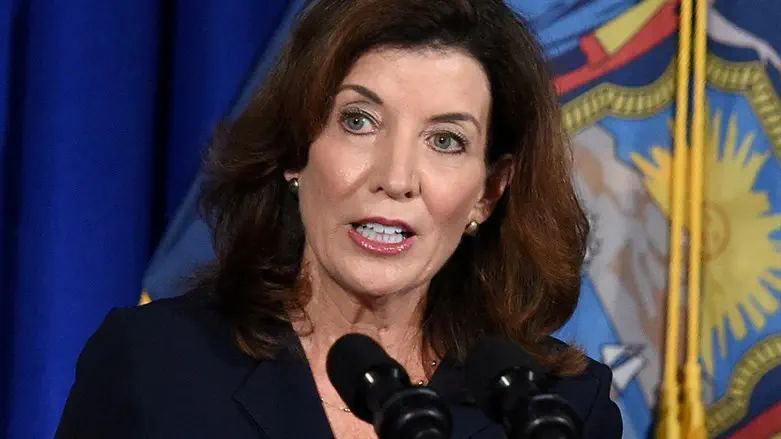
Holocaust education in New York schools will undergo review and New York museums will be required to alert visitors when works might have been stolen during World War II, under the terms of laws that Gov. Kathy Hochul signed into effect Wednesday.
Hochul signed three separate Holocaust-related bills into New York State law during a ceremony at the Museum of Jewish Heritage in Battery Park. A third law will increase pressure on banks that assess fees on payments related to Holocaust reparations.
The Holocaust education bill — sponsored by Sen. Anna Kaplan, a Democrat from Great Neck, and Assembly member Nily Rozic, a Democrat from Queens — will authorize the commissioner of education to conduct a survey about Holocaust instruction within the state.
A 2020 Claims Conference survey of Holocaust literacy found that Holocaust knowledge was particularly low in New York, despite the state having the largest population of Jews in the country.
“What does teaching it really mean?” Hochul asked rhetorically. “That there is a sentence in a history book when you’re learning about World War II, or is it really taught?”
Hochul also brought up the rise in reports of antisemitism in New York and cited Holocaust education as a way to combat the trend.
“We’re going to continue standing with our Jewish brothers and sisters because we know what happens when people turn a blind eye,” Hochul said.
During the press conference, Hochul, who is running for a full term as governor against Rep. Lee Zeldin, the Jewish Republican from Long Island, also took shots at Florida Gov. Ron Desantis, who made a speech in New York in June at a conservative Jewish conference in which he told attendees to move to his state.
“To the 1.77 million Jews who call New York home, thank you for calling New York home,” Hochul said. “There’s no better state. Florida is overrated. Look at the governor.”
A second law that Hochul signed, sponsored by Assembly member Chuck Lavine of Nassau County, will require museums to put up a notice acknowledging that artworks were seized, confiscated or stolen during the Nazi era in Europe.
“They didn’t go buy these,” Hochul said. “These were stolen from people who are the rightful owners during this reign of terror. This will be part of another way to involve Holocaust education in everyday lives.”
Under the terms of the third bill, sponsored by Assembly member Simcha Eichenstein of Brooklyn, state officials will create a list of financial services institutions that waive wire or processing fees associated with Holocaust reparation payments, in hopes of pressuring others to do the same.
“There are some banks doing the right thing,” Hochul said. “The rest of you, you better catch up. The banks should not be profiting off of these individuals.”
Celia Kener, a Holocaust survivor who was born in Poland in 1935, spoke about the importance of the education bill, saying that she once shared her story with a young student, only for his family to “negate everything that they heard or believed.”
“That young man, he needs us,” Kener said. “All the students need us to help them learn and tell what really happened. The consequences of not knowing are truly tragic.”
Kaplan spoke about how Russia’s invasion of Ukraine used Holocaust misinformation as an excuse for war, adding another layer of importance to this bill.
“It is critical that we all know our history and that we teach our next generation about it, no matter how dark or difficult the conversation might be,” Kaplan said.
According to the Anti-Defamation League, New York leads the nation in antisemitic incidents, with the organization tallying 24% more antisemitic incidents in 2021 compared to 2020. The tally included 51 assaults, the highest number ever recorded by the ADL in New York.